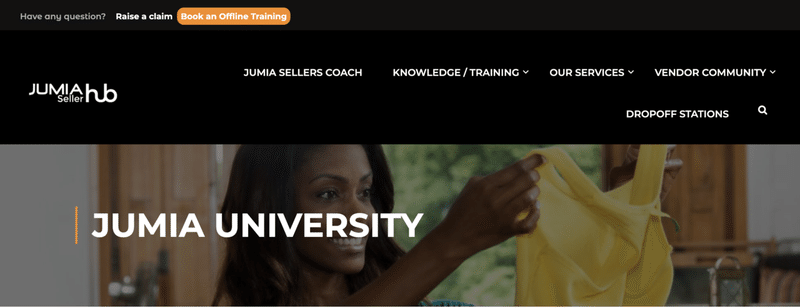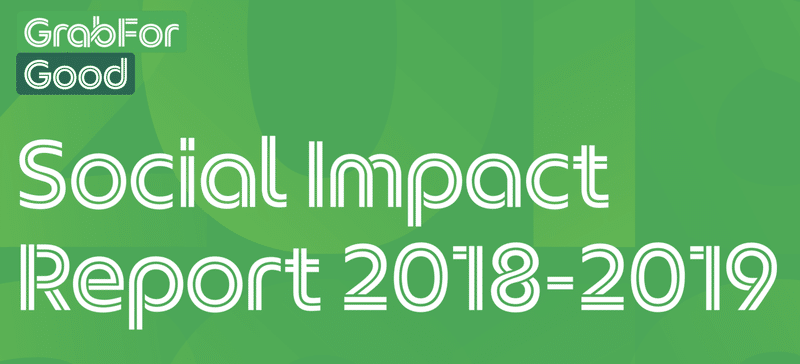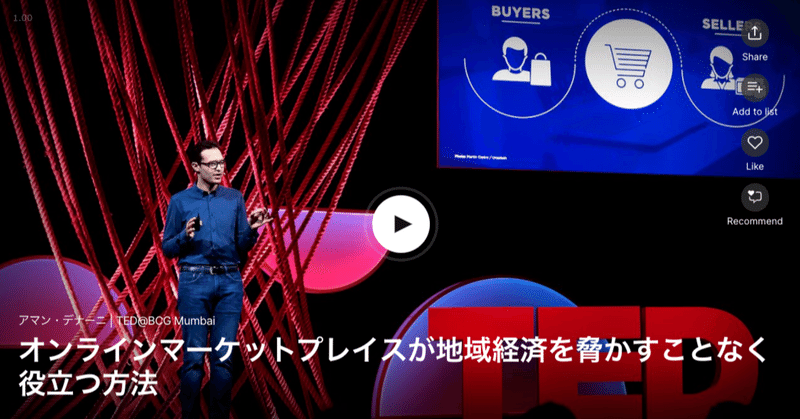
【英語学習&知識蓄積】オンラインマーケットプレイスが地域経済を脅かすことなく役立つ方法
2020/2 #GlobalDevelopment #Business #Work
Amane Dannouni - Digital markets expert
こんにちは、おーたけです。
英語学習しながら、有益な知識も蓄えたい、
そんな一石二鳥の願いを叶えるための活動です。
本日も、私の大好きなTED Talksから、
ぜひシェアしたい&してほしいMovieを紹介します。
■導入
Uber、Airbnb、Amazonのようなオンラインマーケットプレイスの成長は、
時としてローカルビジネスを脅かすことがあります。
タクシー、ホテル、小売店から仕事を奪ったり、
地域社会の収入を減らしてしまいます。
しかし、戦略コンサルタントのアマン・デナーニは、
それ以外にも道はあると言います。
Gojek(インドネシアのバイク版Uber)やJumia(アフリカ版Amazon)を例にあげ、いくつかのオンラインマーケットプレイスでは、慎重なトレードオフの結果、地域経済における既存の事業従事者のシェアを奪わずに融合することで、長期的に全ての人に恩恵をもたらす方法を説明します。
▼ プレゼンテーションはこちら ▼
■Uberはワクワク?それとも破壊者?

In February 2013, my wife and I moved to Singapore.
2013/2月、妻と私はシンガポールに引っ越しました。
Exactly at the same time, Uber has announced it started operations in the country.
ちょうどその頃、
Uberがシンガポールでの配車サービスの開始を発表しました。
Now, my wife and I agree on a lot of things, but using Uber was definitely not one of them.
さて、妻と私は大抵のことに関して意見があうのですが、Uberの利用については、明らかに違いました。
While I was excited about the technology and how maybe we don't need to own cars anymore, she felt that every Uber car is here to steal jobs from taxi drivers.
私は、Uberのテクノロジーにワクワクし、もう自家用車を持つ必要がなくなったのではないかと思いました。
しかし、妻はUberがタクシー運転手の仕事を奪ってしまうと感じていました。
And Sarah was not the only one.
そう感じたのは、妻のサラだけではありません。
As the Ubers, Airbnbs and Amazon of the world what we call "online marketplaces" as they started expanding their presence, we had heard, all of us, countless policymakers worried about how to deal with these new risks of job destruction, lower wages and tax leakage.
世界のUberやAirbnb、そしてAmazonのようないわゆる「オンラインマーケットプレイス」が事業を拡大し始めると、私のような多くの政策立案者から新しいリスクにどう対処するかを懸念する声が聞こえてきます。
雇用喪失、低賃金、課税漏れといったリスクです。
We've also heard company leaders worried about aggressive competition from global platforms eating up their local businesses.
さらに企業のリーダーたちからも、グローバルなプラットフォームがもたらす激しい競争によって、ローカルビジネスが食い尽くされるのではとの懸念の声が上がります。
And on the rational level, of course I understand.
私ももちろん、その道理は理解しています。
After all, this is basic supply and demand economics.
詰まるところ、これは基本的な需要と供給の経済なのです。
If, in any market, you dramatically increase supply, you should expect price, profitability and growth to go down for existing players.
どの市場においても、供給が劇的に増えれば、既存のビジネス従事者にとって、価格、収益性、成長率が低下することを予期しなければなりません。
But in my personal experience, I've also seen the other side of the story.
しかし、私の個人的な経験では、これとは逆の流れも見てきました。
Where online marketplaces, like Gojek in Indonesia or Jumia in Africa, have helped their business ecosystems and the communities around them.
オンラインマーケットプレイスでも、インドネシアのGojekやアフリカのJumiaのように、ビジネスエコシステムや周辺の地域社会に役立つ場合もあるのです。
▶︎ (おーたけ)Gojek [ゴジェック]:インドネシア🇮🇩の配車サービス。
インドネシアでは、Grabと並んで2大配車アプリの 1 つ。
▶︎ (おーたけ)Jumia [ジュミア]:アフリカ最大のEコマース。
アフリカ版のAmazonとも呼ばれる。
The positive side I have seen demonstrates itself in a woman, a taxi driver in Egypt, that now had the opportunity to work without the harassment she faced in the taxi business.
私の見てきた良い事例では、エジプトの女性タクシー運転手が、今まで直面していたタクシー業界におけるハラスメントなしに働けるようになりました。
It demonstrated itself thought a village in Kenya that got an economic boost, because the nearby beautiful but completely unknown lake is now becoming a national ecotourism spot.
ケニアのある村でも、良い事例が見られました。景気が良くなったのです。
全く知られていなかった近所の美しい湖が、今や国エコツーリズムの名所となったからです。
Online marketplaces will continue to grow.
オンラインマーケットプレイスは成長し続けるでしょう。
And they will transform the way we shop, the way we travel and the way we transact with each other.
そして私たちの買い物や移動手段や取引の方法に変革をもたらすでしょう。
So we really need to understand where is the truth between those two stories.
そこで私たちが本当に理解すべきことは、これら 2 つの見方の間のどこに真実があるかです。
Should we expect more of the bright side or more of the dark and worrying side?
より楽観的な結果を予期すべきでしょうか?
それとも暗く悲観的な結果を予期すべきでしょうか?
And is there a way to get the first without getting the second?
そしてマイナス面を避け、プラス面だけを得る方法はあるのでしょうか?
I believe there is.
私はあると信じています。
As a strategy consultant, I study businesses for a living.
生業である戦略コンサルタントとして、私はビジネスを研究しています。
And as a mathematician at heart, I couldn't live with something and its opposite being equally true.
根は数学者なので、逆も同様に成り立つような事象が気持ち悪くてたまりません。
▶︎ (おーたけ)「逆も同様に成り立つような事象が気持ち悪く」
命題における真偽の考え方では、
命題が真の場合、逆は偽となるはずだから、
逆も成り立つ(逆も真になる)事象なんて(数学的に)ありえない!ということですね。
気持ち悪い...とまで感じるのは、数学的思考が体に染み付いている証拠で、
根っからの数学者ってまさにその通りですね。
■オンラインマーケットプレイスがやってることって?
So, I went back to fundamentals, and I asked the question:
そこで私は基本に戻って、こういう問題を立てました。
What do online marketplaces really do?
What do they do?
オンラインマーケットプレイスが実際にしていることは何なのか?
彼らは何をしているのか?
Well, at their core, they're doing something very simple.
まず、根本的にはとてもシンプルなことをしています。
They match sellers and buyers.
売り手と買い手のマッチングです。

That's it.
それだけです。
For drivers and passengers, you get Uber, Grab in Southeast Asia or DiDi in China.
運転手と乗客の間には、
Uberや東南アジアのGrabや、中国のDiDiがあります。
For matching merchants and consumers, you get Amazon, Alibaba or Jumia in Africa.
商人と消費者のマッチングには、
AmazonやAlibaba、アフリカのJumiaがあります。
▶︎ (おーたけ)Alibaba [アリババ]:中国🇨🇳のIT企業で、
言わずとしれた世界最大のBtoB(企業間電子商取引)プラットフォーマー。
And for housing, you get Airbnb;
for fundraising, you get Kickstarter the list goes on.
宿泊にはAirbnbがあって、資金調達にはKickstarterです。
まだまだあります。
▶︎ (おーたけ)Kickstarter [キックスターター]:2009年設立のアメリカ🇺🇸企業で、クラウドファンディングによる資金調達手段を提供している。
What all these examples have in common is that they transition this basic functionality of matching sellers and buyers from the physical world to the digital world.
これらの全てに共通することは、売り手と買い手のマッチングのための基本的な機能を物理的な世界からデジタルの世界へ移行することです。
And by doing so, they can find better matches, do it faster and ultimately, unlock more value for everyone.
そうすることで、より良いマッチングをより早く探せるようになり、最終的にあらゆる人のもとへより多くの価値が広まるのです。
In fact, online marketplaces' core benefit is that they get us more from the same amount of effort.
さらに言うと、オンラインマーケットプレイスの最大の利点は、同じ労力でより多くの価値をもたらすことです。
For example, if you're a taxi driver in San Francisco and you decide to work 10 hours per day, then you're actually having a paying passenger in your car for four hours out of 10.
例えば、あなたがサンフランシスコのタクシー運転手だとして、1 日 10 時間働くとすると、あなたの車に実際に乗客が乗っている時間は 4 時間です。
If you take the same car and put it on a platform like Uber, you can have paying passengers for an additional one and a half hours.
もし同じ車をUberのプラットフォームで利用すれば、乗客を乗せる時間が 1 時間半増やせます。
This is the same car becoming 40 percent more productive.
つまり、同じ車でも生産性が40%向上するのです。
▶︎ (おーたけ)東京のタクシー運転手の平均年収が、約 420 万円ですから、プラットフォームを利用することで約 590 万円(プラス 170 万円)の年収が得られる計算と言うことですね。同じ労力で、これは大きい。
And the same has been proven true for other online marketplaces.
他のオンラインマーケットプレイスでも、
生産性の向上は証明されています。
By design, they create more value for the economy.
経済にさらなる価値を生み出すことが、
オンラインマーケットプレイスのそもそもの目的なのです。
■誰がその新たな価値を得るの?
Now, we need to figure out who gets this additional value.
さて、誰がこの新たな価値を得るのか理解する必要があります。
You can give it to the driver more passengers, more income.
運転手に与えることも可能です。つまり乗客と収入の増加。
You can give it to consumers, if you reduce prices.
価格を下げれば、消費者に恩恵を与えることができます。
Or you can decide that the platform gets to keep all of it.
あるいは、プラットフォームの運営側が恩恵を総取りすることも可能です。
What usually happens is that all three of them wold somehow split it.
大抵はこの 3 者が何らかの形で恩恵を分け合います。
But what about the rest of us?
では、それ以外の人は?
We can also be impacted without being on either sides of this business.
このビジネスと直接的には無関係でも、影響を受ける場合があります。
If neighbor decides to rent his apartment on Airbnb, and we have more people coming in and out of the building, more noise than usual, then I'm getting an unpleasant side effect of this productivity magic.
もし近所の人が自分のアパートをAirbnbで借りると決めたら、前よりもたくさんの人が出入りするようになり、騒々しくなって、不快と感じるでしょう。この生産性のマジックから生じる副作用をです。
This is what economists would call a "negative externality".
これは、経済学者が言う「負の外部性」です。
The negative externality of Uber cars becoming more productive is taxi drivers seeing the value of their licenses drop by as mush as 30 percent in New York, for example.
Uber車の生産性の向上がもたらす、この「負の外部性」によって、
タクシーの営業許可証の価値は下がります。
例えば、ニューヨークでは、多いと30%も低下します。
This is the dark side.
これはマイナスの側面です。
And this is what sparks street demonstrations and sometimes, sometimes, even violence.
これによって街頭デモが起きたり、時々ですが暴動まで起きたりします。
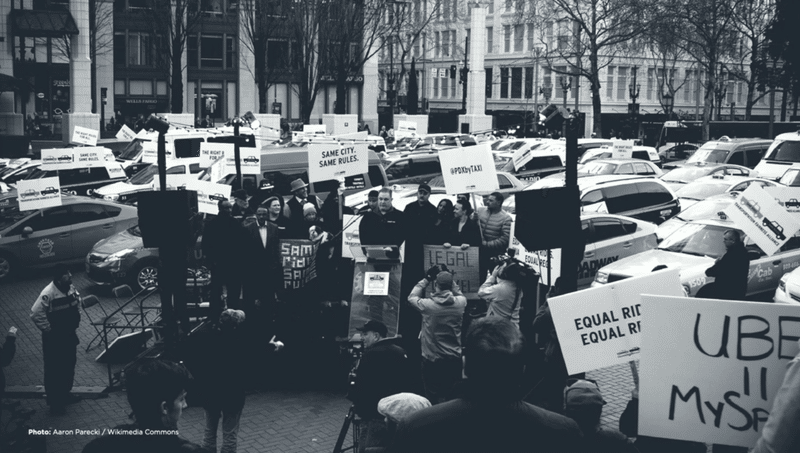
■「負の外部性」は克服できる!
I profoundly believe this is avoidable.
でも、これは回避できると確信しています。
And it became clearer to me the more I have spent time in emerging markets.
新興国市場で、多くの時間を過ごすにつれ、確信に近づいたのです。
In fact, during my time in Singapore, I spent half of any given week traveling in the region, between Malaysia, Thailand, Indonesia, and I became a user actually, more of a fan of online marketplaces that were not that well-known back then.
実際、シンガポール滞在中に、週の半分は周辺国を旅していました。
マレーシアやタイ、インドネシアを。
そして私は、オンラインマーケットプレイスの利用者というより、むしろファンになったのです。
当時はオンラインマーケットプレイスがよく知られてはいませんでしたが。
But some of them made interesting strategic trade-offs that dramatically reduced their side effects, their externalities.
中には興味深い戦略的なトレードオフを行い、副次的な「外部性」を劇的に減らしたものもありました。
■インドネシアの配車サービス"Gojek"の場合
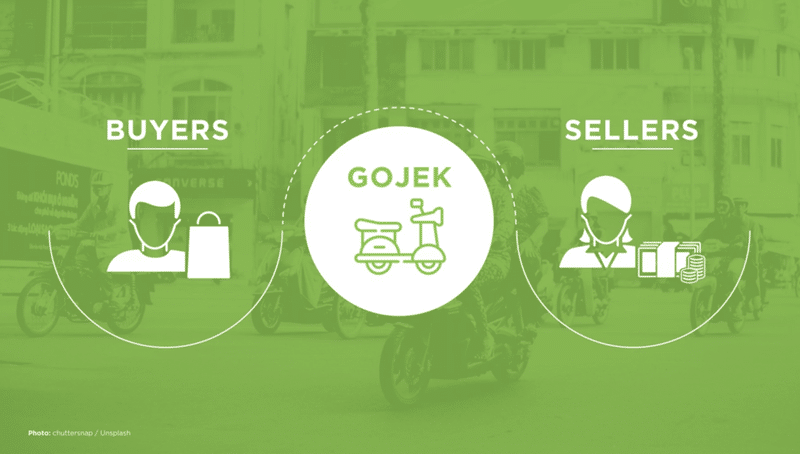
Take Gojek, for example.
例えば、(インドネシアの配車サービス)Gojekです。
They're basically Uber for motor bikes.
Gojekは基本的には、Uberのバイク版です。
They are one of the most liked online marketplaces in Indonesia, and this has a lot to do with the role they chose to play.
インドネシアで最も人気のあるオンラインマーケットプレイスのひとつで、
人気の理由は、Gojekが選んだ役割と大いに関係があります。
Instead of picking a fight with every other transportation option out there, they choose to gradually integrate them within their own platform, so that without leaving the Gojek app, you can check the public transportation schedule and choose to take a bus for a long distance.
他の交通手段の選択肢と敵対するのではなく、
自分たちのプラットフォームに徐々に融合することを選んだのです。
Gojekアプリ内で、公共交通機関の時刻表を調べたり、長距離バスを選択するといったことです。
Then, maybe, a motorbike or a traditional taxi that you can order and pay for from within the same app.
それから、バイクやタクシーの予約や支払いも、同じアプリ内で可能です。
If you look at Gojek today, nine out of 10 previous motor taxi drivers believe their quality of life has improved after joining the platform.
現在のGojekを調査すると、従来のタクシー運転手の 10 人中 9 人が、Gojekのプラットフォームを利用してから、生活の質が向上したと考えています。
And nine out of 10 consumers nine out of 10 believe that Gojek has a positive impact on society in general.
そして、消費者の 10 人中 9 人もが、Gojekは社会全般に良い影響を与えていると信じています。
Now, this level of trust is what allowed Gojek to grow into what is today a super online marketplace for everything from food to grocery even massages and laundry pickups.
ここまで信用を得たことで、Gojekは成長し、こんにちの素晴らしいオンラインマーケットプレイスとなりました。
食料や日用品に始まり、マッサージやクリーニング宅配まで、あらゆるモノを扱っています。
It all came from deliberate trade-off to be an orchestrator of a bigger ecosystem where others also have their role to play, instead of a single winner, a hero, that takes for himself what would, at the end, be a smaller pie.
これは全て、慎重なトレードオフの結果です。
他のプレイヤーたちも自分の役割を持つ、より大きなエコシステムをまとめる立場を目指し、主人公の一人勝ちではなく、結局は大きな市場のほんの一部だったという(悲しい)結末を避けたのです。
▶︎ (おーたけ)慎重に戦略的なトレードオフをとる(他のプレイヤーも活かしたエコシステムをつくりあげる)ことで、井の中の蛙で終わってしまうという結末を回避したということですね。
■アフリカ版Amazon、"Jumia"の場合
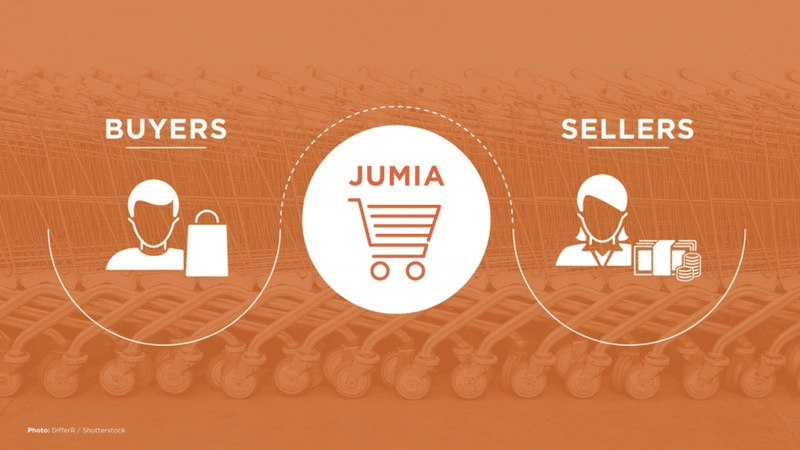
Another interesting example is Jumia.
Jumiaもまた面白い事例です。
Jumia is the equivalent of Amazon in Africa.
Jumiaはアフリカ版Amazonです。
But they don't generate the same level of fear in the small-business community.
しかし、Jumiaは現地のスモールビジネスの世界にAmazonのような不安をもたらしません。
And one of the reasons for that is because they have decided to actively invest in African entrepreneurs, to grow them into the digital age.
理由のひとつが、Jumiaは、デジタル時代における現地の起業家の成長のために、彼らに積極的に投資すると決めている点です。
Now keep in mind, Jumia is operating in countries with some of the lowest digital literacy and digital connectivity scores in the world.
ここで忘れないでほしいのは、Jumiaはデジタルリテラシーとオンライン環境が最低水準である国々で利用されているということです。
Now they could have dealt with that the usual way, though lobbying for reforms and they probably so that but they have also built Jumia University, an e-learning platform where merchants can come and learn basic digital and business skills.
Jumiaは、アフリカのデジタルリテラシーとオンライン環境が世界最低水準だという問題に対し、一般的なロビー活動を通して改革も目指せたでしょうし、おそらくやっているでしょう。
しかし、彼らはJumia大学も設立しました。
プラットフォーム上でeラーニングを提供し、基本的なデジタルスキルやビジネススキルを商人が学べるようにしたのです。
We have studied online marketplaces in Africa last year.
私たちは、昨年アフリカのオンラインマーケットプレイスを調査しました。
And during that study, we have met one of Jumia's merchants.
調査中にJumiaで学ぶ商人の 1 人と出会いました。
His name is Jomo.
彼の名前はジョモです。
He was fired from his job in 2014, and at that time, he decided he wanted to become his own boss.
彼は、2014年に仕事をクビになり、そのとき自分で自身のボスになりたい と決心しました。
He wanted to be independent.
He also wanted to never be fired again.
独立したかったのもありますし
もう 2 度と解雇されたくなかったのです。
So at that time, Jomo had no clue what a business is.
でも当時、ジョモはビジネスの「ビ」の字も知りませんでした。
So he needed to go through a series of trainings to learn how to select products, how to price them and how to promote them online.
ですから彼は、商品の選び方や値付けの仕方、オンライン上での宣伝方法を学ぶために、一連の研修を受ける必要がありました。
Today, Jomo has a 10-employee online business.
現在ジョモは 10 人の従業員を持つオンラインビジネスを営んでいます。
And as of a few months ago, he just opened his very first brick-and-mortar shop in the suburbs of Nairobi.
そして数ヶ月前に、ナイロビ郊外で初の実店舗を開店したところです。
Now, through its university, Jumia has the potential of helping a huge number of Jomos.
今やJumiaは、このJumia大学を通じて、ジョモのような多くの人材を支援する可能性を秘めています。
And we have estimated that together with other online marketplaces on the continent, they can generate three million additional jobs by 2025.
そして、アフリカの他のマーケットプレイスと合わせて、
2025年までに 300 万人分もの雇用を創出できると予測しています。
And they would do that either directly, or through their impact on the wider community.
Jumiaは、雇用の創出を、直接的にもしくはより広いコミュニティーに影響を与えることで実現するでしょう。
And sometimes, taking that wider impact into consideration or forgetting about it can make or break a platform.
そして時として、その広範な影響を考慮に入れるか、考慮し忘れてしまうかで、プラットフォームの存続が左右されることになります。
■プラットフォーマーの勝敗を左右したもの

To illustrate that, let's go back to Singapore.
説明のため、シンガポールの話に戻ります。
So, when decided with my wife to leave the country last year, Uber decided to do the same.
昨年、妻と一緒にシンガポールを離れると決めたとき、Uberも同じく撤退を決めました。
At the same time, again, we started to see that pattern, but maybe it's a coincidence.
またもや同じタイミングです。
パターンが見えてきた気がしましたが、多分単なる偶然だったのでしょう。
▶︎ (おーたけ)自分たちが引っ越すと、Uberも一緒に参入・撤退したという、なんたる偶然!
人って、タイミングが被ると、何か運命の規則性があるのかと錯覚しちゃうことありますよね。あるある。笑
In reality, Uber lost the ride-hailing battle to a Malaysian-born start-up called Grab.
実際のところ、Uberは配車サービスの競争に敗れました。
相手はマレーシア発のGrabです。
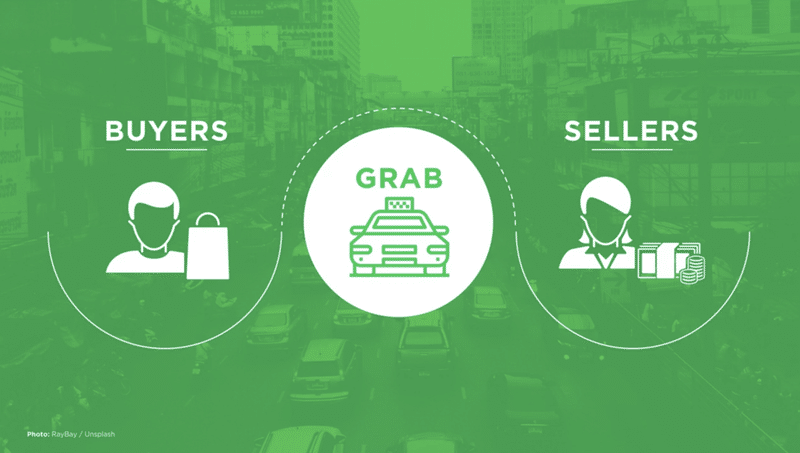
Now, interestingly, my wife didn't have the same level of concerns with Grab, because when Grab started, it had a different name.
さて、興味深いことに、妻はGrabに対して、それほど不安を抱きませんでした。なぜなら、Grabは最初、別の名前だったからです。
It was called MyTeksi, and as the name suggests, it started as a platform for taxis.
MyTeksi(マイタクシー)という名前でした。
名前の通り、タクシー用のプラットフォームとして始まりました。
So when Grab started expanding the driver pool beyond taxis, it was seen as gradual and reasonable.
だから、Grabがタクシーの域を越えて、運転手の登録を拡大し始めたときも、段階的で無理のない展開だと受け取られたのです。
They were also very careful while doing so.
それに、Grabは事業を展開している間も、とても慎重でした。
They thought of what kind of social safety net they should bring to all drivers.
So they put in place special insurance packages and even financial education programs.
どのようなセーフティネット(社会的安全網)を、全ての運転手に提供するかを考え、特別な保険パッケージや財務に関する教育プログラムまで導入しました。
▶︎ (おーたけ)Grabは、社会に与える影響についてのレポートを毎年発行し、東南アジアの日常生活をよりよくするための取り組みを紹介しています。 Social Impact Report 2018–2019
Now, compare that with what happened in London, in New York, in Paris, where taxi drivers didn't feel that the platforms understood they had to pay 200,000 euros for their license and mostly in loans.
対照的に、ロンドンやニューヨークやパリのタクシー運転手たちは、自分たちの営業許可証に、20 万ユーロもかかっていて、大抵はローン払いしていることをプラットフォーム側は理解していないと感じていました。
▶︎ (おーたけ)20 万ユーロは、日本円で約 2,300 万円(*2020/5現在)。
タクシー業をするために必須な営業許可証を得るだけで、2 千万円もかかるなんて非常に高額ですね⚡️
物価は違うと言えど、そりゃ怒りたくなりますよね。
When you don't take that kind of social environmental information into account, you get strong reactions.
このような社会環境についての情報を考慮していないと、強い反感を買うことになります。
I'm not trying to argue that the trade-offs by either Grab or Jumia or Gojek are risk-free.
GrabやJumiaやGojekによるトレードオフにリスクがないと主張するわけではありません。
Did they slow down growth at some point, temporarily?
彼らの成長は、ある時点で一時的に減速したでしょうか?
Maybe.
恐らくそうでしょう。
But look at them today.
でも、現状の彼らを見てください。
Gojek is worth 10 billion dollars.
Gojekの評価額は、100億ドルです。
▶︎ (おーたけ)100 億ドルは、日本円で約 1 兆 600 億円(*2020/5現在)。
日本では、ヤクルト本社 (日本の時価総額ランキング 111 位)と同じくらいのようですが、東南アジアの物価に鑑みるともの凄いですね。
Jumia is one of only three unicorns in the whole of Africa.
Jumiaはアフリカ全土で 3 つしかないユニコーン企業の 1 つです。
And Grab, well, they pushed out Uber out of the whole region of Southeast Asia.
Grabは、Uberを東南アジア全域から追い出しました。
And I also think these trade-offs have nothing specific to emerging markets.
また、このようなトレードオフは、新興国市場に特有のものではないと思います。
Amazon or Uber or others can learn from them and adapt them to their own realities.
AmazonやUberなどは、彼ら(GrabやJumiaなど)から学び、自分たちが直面する現実に適用できます。
In the long run, this doesn't need to be a zero-sum game.
長い目で見れば、ゼロサムゲームである必要はないのです。
▶︎ (おーたけ)ゼロサムゲーム:ゲームの理論の一種で、複数の参加者が存在する中で、それぞれの得点と失点の総和(=サム)が、常にゼロであるというゲームのこと。
例として、為替取引の場合、二国間の為替の取引を行うので市場全体の価値が上がるという事はありえず、一方のレートが上がれば、もう一方のレートが必ず下がるので、ゼロサムゲームが成立する。
In the long run and this is maybe the Asian side of me speaking it pays to be patient.
多分これは私のアジア人的な部分が言っているのですが、
長い目で見れば、辛抱強くいることで報われます。
It pays to reconsider your goal and your priorities in the light of a much bigger equation that includes you and your users, of course, but also it includes regulators, policymakers, your communities.
目的や優先順位を再考することには、価値があります。
より大きな方程式に当てはめてみるのです。
運営者自身や利用者のことはもちろん、規制当局や政策立案者や地域社会を含む方程式です。
And I would argue, above all, it includes the very businesses you are meant to disrupt.
そして何よりも、まさに割って入ろうとしている業界そのものも、方程式に含まれることをお忘れなきよう。
Thank you.
ありがとうございました。
▶︎ (おーたけ)プラットフォーマーとしてやっていくためには、目先の利益だけではなく、他の事業者や社会に与える影響を慎重に考えて、戦略を立てるべきだと。そしてそれには、辛抱強さが必要だと言うことですね。
▼ 音源を聞きたい方は、ぜひこちらをどうぞ ▼
この記事が気に入ったらサポートをしてみませんか?

